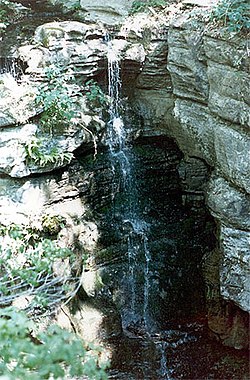| Newsome Sinks Karst Area | |
|---|---|
 | |
 | |
| Location | Morgan County, Alabama |
| Coordinates | 34°26′27″N 86°35′50″W / 34.440833°N 86.597222°W / 34.440833; -86.597222 |
| Area | 9,925 acres (4,017 ha) NNL 1,700 acres (690 ha) |
| U.S. National Natural Landmark | |
| Designated | November 1973 |
Newsome Sinks Karst Area is a privately owned karst formation in Morgan County, Alabama. It was listed as a National Natural Landmark in November 1973.
Description
The valley was named for William Newsome who settled in the area in 1838. It is approximately 4 miles (6.4 km) long and up to .75 miles (1.21 km) wide. The NNL covers 1,700 acres (690 ha), but the total karst area is around 9,925 acres (4,017 ha). There are more than forty caves in the region extending almost 9.5 miles (15.3 km) and up to 400 feet (120 m) deep. The land is part of the Cotaco Creek watershed. The underlying rock is Bangor Limestone formed in the Mississippian Age.
There are over 15 rare species in the area, such as the southern cavefish, gray bat, Indiana bat, American Hart's-tongue fern and Tennessee bladderfern.
During the American Civil War, saltpeter was mined to make gunpowder here, and the Confederates had a leather tanning operation until it was destroyed by Union forces.
References
- "Newsome Sinks Karst Area". National Park Service. Retrieved 14 October 2012.
- ^ Barbour, Michael S. "Middle Coosa River, Upper Coosa River, Eightmile Creek, and Cotaco Creek Nonpoint Source Prioritization Project: Volume 3 Cotaco Creek" (PDF). December 2004. Retrieved 14 October 2012.
- "Sinkholes in Alabama". Geological Survey of Alabama. Retrieved 14 October 2012.
- "Little Known Area of Morgan County Is Alabama's Sinkhole Hot Spot". 5 March 2013. Retrieved 11 April 2016.